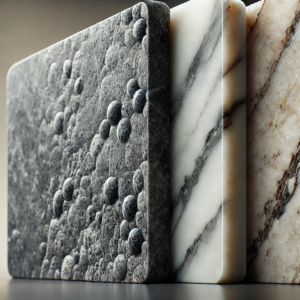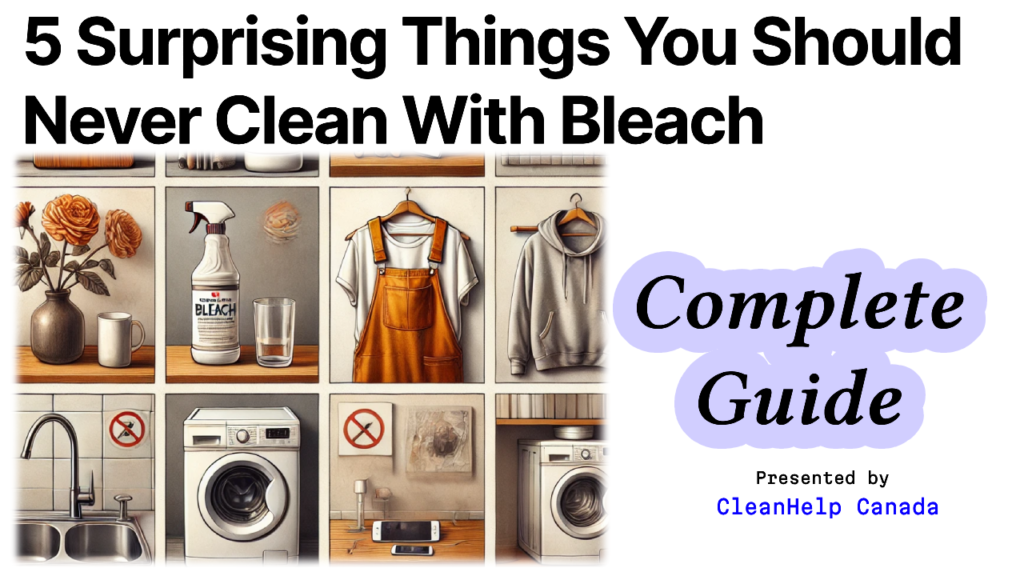When it comes to tackling tough stains and disinfecting surfaces, bleach is often the first choice for many. It’s strong, effective, and fast-acting, which makes it seem like an ideal cleaning solution. However, using bleach on certain items can do more harm than good. In fact, some surfaces in your home require special care to avoid damage or health risks, and bleach can be too harsh for them. Here, we’ll explore five surprising items that you should never clean with bleach and suggest some safe cleaning alternatives to keep your home both clean and intact.
Whether you’re cleaning your home in London, Ontario, or anywhere else, these tips apply universally. And if you’re ever in doubt, consider turning to professional cleaning services like CleanHelp Canada. With a team trained in safe and effective cleaning methods, CleanHelp Canada can handle even the toughest cleaning tasks without risking damage to your belongings. Now, let’s look at these key items and why bleach is a no-go.
1. Natural Stone Surfaces
Natural stone surfaces like granite, marble, and quartz add beauty and elegance to any home. However, bleach is one product that you should never clean with bleach if you want to keep these surfaces in top shape. Using bleach on natural stone can result in severe damage that may even be permanent.

Why You Should Avoid Bleach on Stone
- Bleach cleaning mistakes: Bleach is highly alkaline, which can erode the sealant and natural minerals in stone.
- It weakens the protective coating, making the stone more susceptible to stains and damage.
- Discoloration and dull spots may appear, permanently affecting the stone’s finish.
Safe Cleaning Alternatives
- Use a stone-specific cleaner or a mild dish soap and water mixture.
- Regularly dust and wipe down stone surfaces with a damp microfiber cloth to maintain their natural shine.
- Avoid acidic cleaners like vinegar, which can damage stone similarly to bleach.
For tougher grime, a little patience and gentle cleaning products are key. Or, let professional cleaning services like CleanHelp Canada handle it with the proper products.
2. Stainless Steel Appliances
Stainless steel is a popular material for appliances due to its sleek, modern look. But while bleach seems like a good choice to disinfect, it’s actually one of the worst options. Stainless steel is surprisingly delicate and should be on your list of items to never clean with bleach.
Why Bleach is Harmful to Stainless Steel
- Bleach cleaning mistakes: Bleach can break down the chromium layer that protects stainless steel, leading to corrosion and rust.
- It leaves stains and streaks that dull the shine and require extra polishing.
Safe Cleaning Alternatives
- Wipe down stainless steel with a damp cloth and mild dish soap for regular cleaning.
- For sticky residues, try a 1:1 mixture of water and vinegar.
- Use a microfiber cloth to buff the surface to a streak-free finish.
A professional cleaner will know the right way to care for stainless steel, ensuring it maintains its sleek appearance. Professional cleaning services can save you time and stress by using the proper methods for long-lasting results.
3. Wooden Surfaces and Furniture
Wood is a porous material, meaning it easily absorbs moisture and cleaning products. Using bleach on wood is one of the biggest bleach cleaning mistakes you can make, as it can dry out, discolor, and even warp wood over time. For wooden furniture and floors, you should definitely never clean with bleach.
Why Bleach is Harmful to Wood
- Bleach strips natural oils from wood, leaving it brittle and prone to cracks.
- It can cause fading or blotchy stains, especially on unfinished wood.
Safe Cleaning Alternatives
- Dust regularly with a microfiber cloth to keep wood surfaces clean.
- For deeper cleaning, a wood-safe cleaner or a diluted mild soap solution works well.
- Use a soft, dry cloth to buff the surface and restore shine.
For wooden surfaces that require extra care, consider hiring professional cleaning services. CleanHelp Canada understands how to clean wood properly, protecting its natural beauty and extending its life.
4. Fabric and Upholstery
Bleach is often seen as a powerful stain remover, but when it comes to fabric and upholstery, it’s a no-go. If you’re unsure, remember that these materials should always be on your list of things to never clean with bleach.
Why Bleach is Harmful to Fabric and Upholstery
- Bleach weakens fabric fibers, causing fading, holes, or tears.
- It can cause color loss or bleach spots, especially on colored or delicate fabrics.
Safe Cleaning Alternatives
- Check the care label for fabric-safe cleaning recommendations.
- For general cleaning, a mild dish soap and warm water solution works well on most fabrics.
- For stains, a mixture of vinegar and water or a baking soda paste can be effective and safe.
When tackling delicate fabrics, professional cleaning services can be a real help. CleanHelp Canada specializes in safe methods for upholstery, ensuring you avoid bleach cleaning mistakes and keep your furniture looking its best.
5. Glass and Mirrors
It’s common to think that bleach is safe on glass, but it’s another surface you should never clean with bleach. Bleach can leave residue, creating a cloudy or streaked appearance on glass and mirrors.

Why Bleach is Harmful to Glass and Mirrors
- Bleach leaves a film that’s difficult to remove, making glass look cloudy and streaky.
- It can damage the backing on mirrors, leading to black spots and a deteriorated look.
Safe Cleaning Alternatives
- Use a vinegar and water solution for a streak-free clean.
- For extra shine, wipe with a microfiber cloth.
- A mixture of rubbing alcohol and water can also help with sticky spots.
To make sure mirrors and glass surfaces stay spotless, professional cleaning services are a great option. A service like CleanHelp Canada uses gentle yet effective methods to keep glass sparkling, without the risks associated with bleach.
General Tips for Using Bleach Safely
Bleach can be a useful cleaner, but to avoid bleach cleaning mistakes and find out where to never clean with bleach at home, follow these safety tips:
- Dilute appropriately: Always follow manufacturer instructions for dilution. Using undiluted bleach is too strong and can be harmful.
- Ventilate the area: When using bleach, keep windows open or use fans to reduce exposure to fumes.
- Wear gloves: Always wear gloves when handling bleach to protect your skin from irritation.
- Don’t mix bleach with other cleaners: Mixing bleach with other chemicals, especially ammonia, produces toxic fumes.
Being aware of safe cleaning alternatives is essential to keeping your home clean and safe. And if bleach seems too risky or time-consuming, professional cleaning services can provide a solution.
The Benefits of Choosing Professional Cleaning Services
When you’re balancing work, family, and life, sometimes it’s challenging to remember all the details of safe cleaning. That’s where professional cleaning services come in. Companies like CleanHelp Canada in London, Ontario, know the ins and outs of using the right cleaners on every surface. By trusting them with your cleaning needs, you can avoid bleach cleaning mistakes and enjoy a safe, well-maintained home.
At CleanHelp Canada, the team is trained to clean responsibly, using safe cleaning alternatives and gentle methods to protect your belongings. From delicate wood furniture to sensitive stone surfaces, they’ve got you covered, bringing expertise and care to every cleaning session. Whether it’s daily maintenance or a one-time deep clean, professional cleaning services offer peace of mind and make your home a healthier place.
Visit CleanHelp Canada to learn more about their expert services and discover how they can help you with safe, effective cleaning. With their support, you can keep your home shining without the risks of using bleach on the wrong surfaces.
Conclusion
While bleach can be a powerful cleaning agent, knowing when never to clean with bleach can save you from costly mistakes and even damage to your home. By recognizing the items that require safe cleaning alternatives—such as natural stone, stainless steel, wood, fabric, and glass—you can keep these surfaces in excellent condition.
Cleaning carefully is a vital part of maintaining a beautiful, healthy home. If you’re looking to save time and ensure every surface gets the best care, consider the benefits of professional cleaning services. For those in London, Ontario, CleanHelp Canada offers cleaning expertise with a focus on safety and effectiveness. Let them handle the hard work, so you can relax knowing your home is in good hands.
So next time you reach for the bleach, think twice. And if in doubt, professional cleaning services are only a call away to handle the job safely and efficiently.
